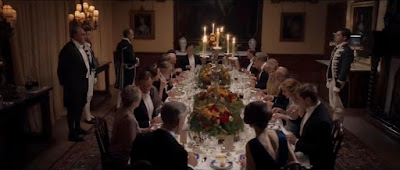or
"Will You Have Enough Cliches To Get You Through the Visit?"
There has always been a dramatic tension about "Downton Abbey". Not the tensions between upstairs and downstairs, the privileged and the privileging, that's been done before.
No, what makes "DA" different is its acknowledgment that the very life its depicting is going to go away, there is a built-in tension of time, that maybe these old ways are unrealistic and "we" should sell the place and get on with our lives, after all, who are we doing this for, if not ourselves. It makes all the fussing and fustiness precious—in the valuable way, not the sarcastic way.
At the same time that writer Julian Fellowes (whose conceit this is) is celebrating the old ways of the past, he is also focusing on the "becoming." Things are changing, there is the usual hesitancy, a bit of grousing (usually from matriarch Violet Crawley played by Dame Maggie Smith), but no filibuster, no stonewalling, the future is welcomed, not feared, and, who knows, something good may come of it. Carry on.
Pip. Pip. I'm not sure there HAD to be a Downton Abbey The Movie, but it's nice to see it's there and be able to partake of it, rather like observing the hoity-toityness of the British upper-class. Nice to see SOME-body's doing it, even if we don't have to participate. Sounds like a lot of work. As Lady Edith (Laura Carmichael) laments: "If I know one thing about Royal visits, we will never stop changing clothes!"
 |
| What all the fuss is about... |
Sure, the visit just entails a lunch and dinner (with a parade and a crowning ball), but it still throws things into a lather: everything must be cleaned and polished, the kitchen staff must be at the top of their game, despite being Royal-struck and time is short. So, of course, there must be complications. Lady Mary Crawley Talbot thinks things aren't as ship-shape as they could be, and so she recruits retired butler, Mr. Carson (the incomparable Jim Carter) to return, which puts new butler Thomas Barrows (Robert James-Collier) into a passive-aggressive snit; the cooking staff learns that meals will be prepared by the King's chef (Phillipe Spall), which turns them rebellious; the matriarch Violet Crawley is miffed that her son, Robert, the Earl of Grantham (Hugh Bonneville) is being left out of the will of her sister, Maud Bagshaw (Imelda Staunton), the Queen's lady-in-waiting, and is intending to have it out with her, which puts her—again—in conflict with distant cousin Isobel Crawley Merton (Penelope Wilton) who urges peace.
Then, there's the little business of an assassination attempt on the King by Irish Republicans, that involves Crawley son-in-law and former footman Tom Branson (Allen Leech), a little bother of missing pieces of finery, a conspiracy formed by the husband-wife team of Bates and Anna (Brendan Coyle and Joanne Froggatt), a potential scandal involving Barrows; and some personal problems involving specific members that does and does not threaten the future of Downton Abbey.
And chairs. Are there going to be enough chairs?Now, I managed to miss the entire of the final Season 6 of the series, but, as with any good soap opera, things don't move so fast that you don't pick up on the missing transitions between visits. One is merely comforted that the characters are acting just the way you left them; no matter what's happened since, they have not matured past their failings or been corrupted out of their better natures. They are constants in their tendencies and the small little bumps in the road have not altered them too much.
The presentation has changed, and changed quite a bit. The widescreen format of the film allows for more cast-members to crowd into the frame, which is always nice in an ensemble piece. The movie run-time of slightly over two hours allows for such luxuries as held reaction shots after frame-exits, and a slightly more leisurely pace. This, however, is compensated for by something that was somewhat implied in the series, but a bit limited by its format. That is something called "sweep."
One notices this early on, as a gentler version of the series theme plays over the theater credits and one is given to rather amazing aerial shots of "the" Abbey, accomplished (if one judges by the credits) not by helicopter and not by drone, but by aerial balloon. How thoroughly precious is that? They're not even betraying the time-frame behind the scenes. And it gives those shots a serenely bold feeling as hover over the estate, presaging a camera that is constantly in motion, constantly wheeling for fear that if it stopped the whole thing might fall apart.
It gives the movie a marvelous rondeau-esque quality, reminding one that it is in the grand movie tradition of manner dramas that show the clash or new and old and the sacrifices those clashes demand. In this, we're dealing with three tiers of Class structure and the demands that each set upon the other, and how, if we all mind our manners, each supported by the other, lest the whole things collapse. And, if weakness or temerity is shown, well...there is always some one out of frame who might see things from another angle off-stage to lend assistance.Precious it is. But, in a world where one looks at History and one can see the inevitable march to reality where everything that can go wrong does so, the world of Downton Abbey—where everything goes right—is a comfort, a fine re-past where everything is just so...and everything is just so right. Where people of good intention have their intentions fulfilled.
It is a fine soufflé that does not fall, a tea that is not bitter, comfort food that warms the soul and raises the spirit.
And more importantly, it isn't followed by someone asking for your support for your local PBS station.
Thank you.












No comments:
Post a Comment